FOCUS ON
ENVIRONMENTALLY FRIENDLY GLASS PRODUCTS

Georgian Glass Market provides Georgian manufacturers with quality glass tar and the materials necessary for molding PAGE 7


Georgian Glass Market provides Georgian manufacturers with quality glass tar and the materials necessary for molding PAGE 7

World-recognized Italian cuisine is also popular with and held in high regard by many Georgians due to the unforgettable taste of the dishes and certain similarities with Georgian cuisine. However, it’s not easy to find a restaurant in Georgia’s capital where one can enjoy original Italian dishes prepared with local ingredients and spices. That was the main idea behind the opening of Italian restaurant ‘Ambrosiana’ a year ago, in the historic part of Tbilisi. Since then, the restaurant has been impressing guests with its cozy, home-like environment, special design, friendly and professional staff and service, and its delicious dishes.
The facility is located in a residential block on the central Chovelidze Street heading to Mtatsminda (Holy Mountain), one of the most popular sights of the capital and a symbol of the city. Its location allows guests to enjoy beautiful views of Old Tbilisi. The restaurant also has another branch at Lubliana Street, Dighomi district, which was the first branch opened 6 years ago.
In this week’s issue...
EU Ambassador’s Visit Highlights Cooperation with Adjara
NEWS PAGE 2
Tbilisi’s First Buneba (Nature) Fest, June 17-18, Mziuri Park
NEWS PAGE 3
Will Georgia and Azerbaijan’s Military Cooperation Leave Armenia in the Cold?
POLITICS PAGE 4
Prof. Orlando Figes on a Post-Putin Russia and Busting the Russian’s Belief that They Need a Tsar
POLITICS PAGE 6
GIMPHA with Megalab Hosted the GIMPHA Eighth International Health Conference
BUSINESS PAGE 8
400 Sadagi Volunteers Restore Natural Beauty of Bakuriani
SOCIETY PAGE 10
I Will Hold You
CULTURE PAGE 11
PreparedforGeorgiaTodayBusinessby
On June 23, from 2pm, Georgia Energy Day is to be celebrated in Tbilisi’s Dedaena Park.

Visitors can expect educational and fun activities about renewable energy and energy efficiency, engineering and technology. All will have the chance to participate in workshops and learn daily energy-saving practices, and discover the companies that produce or sell energy-efficient technologies
The event will create a rich and engaging experience for all age segments through educational workshops, and an exhibition of energy-efficient technologies and activities specially prepared for children.
Children can take part in interesting lectures that pique their curiosity and foster knowledge of sustainability, engage with interactive exhibits that highlight
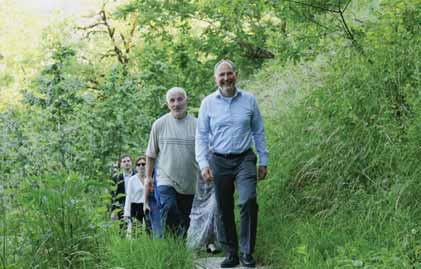
the advantages of energy conservation, and indulge in activities that promote an awareness of renewable energy sources.
The event will be hosted by singer and TV host Elene Kalandadze. Guests will have the opportunity to enjoy the music selected by the musician and composer, Erekle Getsadze, throughout the day, and at the end of the event, attend a musical concert performed by local band 4D Monster Lobsters.
The event is being organized by the The Ministry of Economy and Sustainable Development, with the support of the European Union and KfW development bank and in partnership with the German independent energy consulting company GOPA intec as part of the Georgian Energy Sector Reform Project (GESRP). The event is supported by Tbilisi City Hall & CENN.
Pawel Herczynski, Ambassador of the European Union to Georgia, recently concluded a successful visit to the Adjara region, aimed at fostering stronger ties between Adjara and the European Union. The visit encompassed a wide-ranging agenda, including meetings with government officials, civil society representatives, businesses, media representatives, and youth.
During his visit, Ambassador Herczynski inaugurated the Euroclub in Keda, contributing to the region's development and educational opportunities. The Ambassador engaged in fruitful discussions with various stakeholders, emphasizing the EU's commitment to areas such as urban development, sustainable tourism, maritime cooperation, judicial reforms, civil society engagement, and youth empowerment.
The visit also highlighted the EU's dedication to supporting grassroots initiatives, local entrepreneurship, and sustainable rural development. Ambassador Herczynski had the opportunity to visit local businesses, including the Nuri Sirabidze Wine Cellar in Keda, supported through FAO initiatives, and the
Guesthouse "Woodhide" in Machakhela National Park, supported through the ENPARD and UNDP program. These visits underscored the EU's commitment to economic growth, sustainable tourism, and community support.
The Ambassador's visit concluded with a meeting with religious representatives, emphasizing the EU's commitment to promoting religious tolerance and peace-
ful coexistence.
Ambassador Herczynski's visit to the Adjara region reaffirmed the strong and growing partnership between the European Union and Georgia. The discussions and interactions throughout the visit showcased the EU's commitment to supporting economic growth, social development, and shared values in the region.
The EU supports the Venice Commission recommendations - better not to adopt the draft law on de-oligarchization given the described risks, - the EU Delegation to Georgia said in a statement Wednesday.
"The EU supports the Venice Commission recommendations: better not to adopt the draft law on de-oligarchization given the described risks. The EU is ready to support the Georgian authorities to find a better way forward with a systemic approach. We can move forward stronger together," the statement reads.
The Parliament considered the draft law on deoligarchization as the last issue of Wednesday’s plenary session, and adopted it in the second reading with 81 in favor, 2 against.
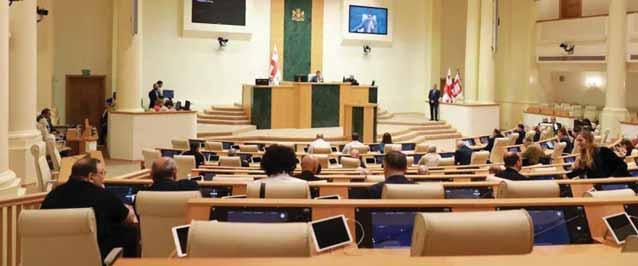
The draft law was edited in April, based on the interim recommendations of the Venice Commission.
ligarchization earlier that day.
According to the Venice Commission, the draft law should not be adopted and there should be no deviation from the "systemic" approach.
BY ANA DUMBADZEEmployees of Georgian Manganese LLC in Chiatura have gone on hunger strike, demanding equitable wages and enhanced working conditions. Miners, along with their families, continue to protest on the streets. The strike has caused a complete halt in operations across all mines, affecting over 3000 employees.

The reason for this, according to the miners, was the failure of the company to meet their demands. Nine miners went on a hunger strike.
The employees of the “Georgian Manganese” mines in Chiatura have been protesting for the ninth day, demanding improvement in working conditions. On June 11, they met with the company’s representatives, however, as the acting
president of the metallurgical, mining and chemical industry workers union reported, no agreement was reached at the meeting. The acting president of the trade union claimed that the company had not offered new conditions for the employees.
In turn, Georgian Manganese says that “constructive dialogue” with the employees regarding the issue continues.
The reason for the miners’ protest is a change in the work schedule introduced by Georgian Manganese in February.
The protestors are also demanding decent compensation. Trade unions say that the employees demand to be paid according to the tons of extracted raw materials.
In addition, the workers in the Chiatura mine demand: Protection of labor safety, change of equipment, ventilation of the trenches, change of insurance company, cancellation of pension savings, use of vacations, and settlement of the ecological issues facing the city of Chiatura.
According to the draft law, the issue of recognizing a person as an oligarch shall be decided by the Anti-Corruption Bureau instead of the government. The AntiCorruption Bureau will start the procedure of recognizing a person as an oligarch on its own initiative, or on the basis of an appeal from a member of the government, a permanent member of the National Security Council, the National Bank, the State Security Service, or the National Communications Commission.
The Venice Commission had published its final opinion on the draft law on deo-
The Venice Commission recommended the Georgian government devise corrective, additional or complementary legislation or measures, which inter alia include: Establishing and implementing an effective competition policy; strengthening the fight against high-level corruption and the prevention of corruption, in line with GRECO’s recommendations; upholding the transparency of and accountability in public procurement; strengthening media pluralism and transparency of media ownership; further enhancing the anti-money laundering policy, including the transparency of legal persons and arrangements and timely and effective access to beneficial ownership information, in line with MONEYVAL and FATF recommendations; reinforcing rules on the financing of political parties and election campaigns and existing control mechanisms; amending tax legislation.
The Venice Commission underlined that, in order for the above-mentioned system to function effectively, the holistic reform of the judicial system aimed at ensuring its independence, integrity and impartiality, including of the High Council of Justice, fully in line with Venice Commission recommendations, should be relentlessly pursued.
“The Venice Commission underlines at the outset that the danger of the concentration in the hands of a private individual of significant influence over the economic, political and public life of a
country without transparency, legitimacy and accountability may exist in virtually any country. Most countries have devised and put in place a set of interconnected legislative, (inter)institutional, administrative, economic and other measures, in order to prevent the disruptive effects on democracy, the rule of law and human rights brought on by the concentration of such influence with the objective of leveling the playing field for all actors in society. Rather than pursuing this multi-sectoral, “systemic” approach, Georgia has chosen to tackle the destructive influence of oligarchization through a different “personal approach”, by preparing a draft law on de-oligarchization. This “personal approach”, as specified by the revised draft law, seeks to identify persons as “oligarchs” through specific criteria, such as wealth, media ownership (etc.), and subjects them to a series of limitations. Despite having been deprived of most of its punitive consequences and limitations in its revised version, the potential political abuse of the revised draft law and a possible arbitrary application of its provisions may still severely jeopardize the rule of law and political pluralism. While recognizing that in the fight against oligarchic influence there is no one-size-fits-all and that in exceptional, extremely critical situations, for example a situation of state capture, radical solutions – such as some measures of a personal nature –could appear to be justified, as a measure of last resort, on a temporary and exceptional basis, the Venice Commission considers that these should be a supplement, not an alternative, to the “systemic” approach”, reads the report.

“Our organization Vegan Georgia, which is made up of managers, journalists, lawyers and many other experts in various fields, together with other animal rights activists, has been very active in organizing actions and events, and we decided we were ready to organize something more grandiose. That's how the idea of holding Buneba Fest came about. We chose Mziuri, a central park in Tbilisi, as the location of the festival, because it’s popular as a hang-out on hot summer days, and the layout of the park perfectly suited the goals of the festival. In the process of working on this festival, we met many new activists, which is a great discovery for our organization.
BY KATIE RUTH DAVIESTbilisi’s first large-scale vegan eco-festival, Buneba Fest, is coming to Mziuri Park on June 17-18, and you won’t want to miss it.

The Buneba Fest team, made up of experienced event organizers and eager vegan and animal-loving volunteers, have been working hard to prepare a weekend packed with informative lectures, handson master classes, live music, delicious tastings, workshops, and more. They say guests will be able to sample a diverse array of plant-based cuisine at the food court, featuring some of the country’s most talented chefs and vendors, and will have a marketplace to browse to discover a variety of plant based prod-
ucts and sustainable goods.
The Georgian vegan movement is young, but it's growing fast. In 2022, you may have noticed a lot of new vegan cafes and restaurants opening in Tbilisi and Batumi, and new vegan products being sold on the market. It seems timely, then, for a large event to be held that helps local people to get acquainted with this market, to help them figure out what veganism is, and just how easy it now is to be a vegan.
We at GEORGIA TODAY fully support the Buneba Fest team in promoting a more conscious and sustainable world for animals, the planet, and people alike, and we will be heading along this Saturday and Sunday with our kids to learn from industry experts and advocates on topics such as animal welfare, ethical living, and healthy eating, and joining in on vegan masterclasses. We’ll also get
the chance enjoying live music performances from local artists and soak up the positive and vibrant atmosphere of the festival.
GEORGIA TODAY sat down with two Georgian women of the many involved in the organizing of the festival – Vegan Georgia President Nini Turiashvili and Tamar Gverdtsiteli, a freelance graphic designer.
“‘Buneba Fest’ is the first large-scale event in Georgia about animal rights and environmental protection,” Nini tells us. “The festival is organized by Vegan Georgia in cooperation with Anima International. The international team has been successfully holding events since 2010. There will be catering spaces, lectures, musical performances, workshops, a market, a children's corner and other educational and entertainment activities aimed at every segment of society.
“The festival supports businesses and non-profit projects that are related to the production of eco-friendly and animal-free products,” she notes. “Our main goal with Buneba Fest is to raise public awareness of the idea of animal freedom, the vegan worldview and an eco-friendly lifestyle.”
She emphasizes that Buneba Fest is a non-commercial event. The money and donations received will be used for animal rights activism, veganism and technical support for the festival.
“When I saw Georgia’s vegans were organizing a Buneba Festival and they
needed volunteers, I signed up, because I want people to know more about veganism, to get deeper information about cruelty against animals, about vegan nutrition and their connection with a healthy life and environment,” Tamar tells us. “I’ve been vegan myself for quite a while, and even started a food blog [instagram.com/kinda_healthy_meals], where I share easy vegan recipes for people who can't imagine their lives without meat and cheese.
“We expect more people to get interested in environmental issues and veganism as a result of attending this two-day festival. It will give them a chance to get all the information they need. For me personally, this event is all about having fun without harming animals or the environment. There will be lectures, cruelty-free products, food, and activities that can be done with minimum damage to our planet.
“I think Buneba Fest will make it easier for people to understand the environmental issues we’re facing today and their footprint on all of it, and to consider doing something positive about that impact,” Tamar concludes.
Check out Buneba Fest’s facebook and Instagram pages for updates and the latest details.
the village of Makarivka in the direction of the southern port city of Berdiansk, as well as in the areas of Novodanylivka and Novopokrovsk in the Mariupol direction.
In other news, the Ukrainian port city of Odesa was the target of a Russian missile strike that left three people dead and at least 13 injured, according to officials. The region of Donetsk was also targeted, leaving three civilians dead and others wounded.
At least three people died after shelling destroyed seven homes and damaged dozens more in the eastern Ukrainian cities of Kramatorsk and Kostiantynivka on Wednesday, according to a Telegram post from Pavlo Kyrylenko, governor of the Donetsk province.
mobility were evacuated from the rising flood waters.
According to the data collected by the agency, more than 3,000 houses were flooded in the Kherson region.
The lower house of Russia’s parliament said Wednesday it had voted to give its initial backing to legislation that will allow the Defense Ministry to sign contracts with suspected or convicted criminals to fight in Ukraine.
Russian President Vladimir Putin this week claimed Ukraine’s counteroffensive is failing, saying Kyiv has failed to achieve any success.
“This is a large-scale counteroffensive, using reserves that were trained for this purpose, it has been underway since the 4th of June and is still underway, right now,” Putin said Tuesday at a meeting with war correspondents.
“[Ukrainian troops] have not reached the front line,” Putin said, claiming that “the adversary was not successful in any sectors. They have huge losses.”
Ukraine in turn says it has liberated several settlements in Donetsk, eastern Ukraine. President Zelensky said Tuesday that “there is advancement in different areas,” but there are also reports Russia is contesting several villages that Kyiv claimed to have retaken. On Wednesday, Ukraine’s deputy defense minister said there are “extremely fierce” battles.
Commenting on Telegram, Hanna Maliar said Ukrainian fighters had advanced up to 500 meters in the Bakhmut area over the past 24 hours, and up to 350 meters in the Zaporizhzhia area in southern Ukraine.

“Our troops are moving in the face of extremely fierce battles, aviation and artillery superiority of the enemy,” Maliar said Wednesday. She said fighting was continuing near
The Associated Press reported that the Ukrainian presidential office said a missile hit the Ukrainian-controlled city of Kramatorsk, where Kyiv’s forces are headquartered. The office said that strike killed two civilians and wounded two others while damaging 29 homes.
Meanwhile, Russian shelling in the eastern city of Kostiantynivka in Ukraine killed one civilian, with 57 houses damaged, it added.
Ukraine’s Ministry of Internal Affairs said on Telegram that approximately 2,757 people have been evacuated in the Kherson region following the attack on the Kakhovka dam last week.
The ministry said that about 263 children and another 77 people with limited
The destruction of Nova Kakhovka dam in Ukraine has led to devastating humanitarian and ecological consequences. While evacuations of affected populations are underway, Ukraine has requested international EU assistance in the form of equipment and machinery for relief efforts. In an immediate response, the EU is already channeling aid via its Civil Protection Mechanism thanks to first offers from Germany, Austria and Lithuania. Germany has offered 5,000 water filters and 56 generators, and Austria 20 water containers and 10 mud water pumps, which are now on their way to Ukraine. In addition, Lithuania and Germany have also offered shelter equipment, including tents, beds and blankets.
“The EU's Emergency Response Coordination Center is in direct contact with the Ukrainian emergency services to monitor the exact needs on the ground, and stands ready to coordinate further assistance into Ukraine based on the emerging needs. At the same time, the EU's humanitarian office in Ukraine is coordinating with its humanitarian partners to rapidly respond to the needs of those affected by flooding, including by providing food assistance and drinking water,” the EU announced. RUSSIAN
More than 15 months into what Russia calls its “special military operation” in Ukraine, Moscow, whose forces have suffered heavy losses, is trying to recruit more soldiers for what is Europe’s largest land war since World War II.
Under the proposed changes, a contract could be concluded with someone being investigated for committing a crime, who is having their case heard in court, or after they have been convicted but before the verdict takes legal effect, according to the database of the State Duma, the lower house.
People convicted of sexual crimes, treason, terrorism or extremism would not be able to sign up.
Those who do sign up would be exempt from criminal liability upon completion of their contract or if they receive awards for their combat prowess.
The Wagner mercenary group was previously allowed to recruit convicts from prisons to fight in Ukraine but said in February it had stopped. Prison rights activists say the Defense Ministry has taken over the process but wanted to make changes.
The new changes being examined by the Duma do not cover recruitment of people already serving their sentences. The Defense Ministry has not commented.

military technology, research, and development, particularly in the latter’s unmanned combat aerial vehicle (UCAV) programs. Turkey’s famous, or infamous depending on one’s position, Bayraktar line of UCAVs made short work of Armenian units during the 2020 NagornoKarabakh War, and continue to make waves in Ukraine, among other conflicts.
For Georgia, access to this cutting edge technology, as well as Turkish doctrine and military science, could elevate the nation’s defense framework to new heights. With the ever present abusive ex-husband of Russia to the north, this benefit carries considerable weight for Tbilisi military planners. In addition, the potential of having the Kremlin think twice about further entanglements with Georgia due to the possibility of angering Ankara would pay dividends for national security.
But where does this leave Armenia?
BY MICHAEL GODWINThe triumvirate of the South Caucasus has once again been shaken. While Georgia, Armenia, and Azerbaijan each possess their own distinct aspirations on the larger world stage, they are also intricately woven together by geopolitics. However, it seems Yerevan is being left out from the region’s defense and security assurances, all while facing impending conflict with Baku.
In late April, Georgian Defense Minister Juansher Burchuladze and his Azerbaijani counterpart Colonel General Zakir Hasanov inked an agreement that sees the two nations deepening their military collaboration. According to the Ministry of Defense, the renewed agreement is aimed at strengthening strategiclevel meetings, military education, additional training exercises, and an Azerbaijan-Turkey-Georgia “trilateral cooperation format”. Burchuladze said the partnership “confirms the readiness
to strengthen ties for the benefit of the countries and the region.”
However, it is immediately clear who is left in the cold following this warming of Georgian-Azerbaijani relations. Armenia, left to its own devices, seems to be again discarded in favor of more lucrative friends. With its extensive energy production and links to NATO members Turkey, Azerbaijan simply has more to offer Georgia.
Yerevan has long toed a precarious line between Russia, who still maintains a significant permanent military presence in the country, and the West, to include Georgia. Backed into a corner after generations of conflict with its Turkic neighbors, it has grown wary of friendships.
While the perceived weakening of Russia in the region due to its Ukrainian debacle has caused leadership in Yerevan to begin to look elsewhere, its immediate neighbors seem to have moved on.
Georgia, who has tirelessly worked to maintain a role of neutrality and even peacemaker between Azerbaijan and Armenia, has made more overt signals that its preference is with the inseparable duo Azerbaijan and Turkey. The
reasons for this are simple.
Azerbaijan, with its vast oil and gas production, offers Georgia a way to not only diversify but also limit or even remove its dependence on Russian energy sources. The value of this cannot be understated, as Tbilisi could strike an immense blow to the Kremlin should it remove dependence on Russian imports virtually entirely. Additionally, this would certainly win Georgia the praise and adoration of its Western allies in light of increased calls for additional political and economic pressure on Moscow. However, it’s not all about energy. Azerbaijan and its big brother Turkey offer Georgia far more in potential investment. Both in part due to Baku’s cashprinting energy industry and Turkey’s considerable investment potential, Georgia stands to gain from the duo’s deep pockets. Infrastructure projects, business investments, and commercial expansion have already whetted Tbilisi’s appetite for further cooperation.
Then there is the defense and security aspect, highlighted by the recent agreement renewal. Azerbaijan and Turkey are significant players in the realm of
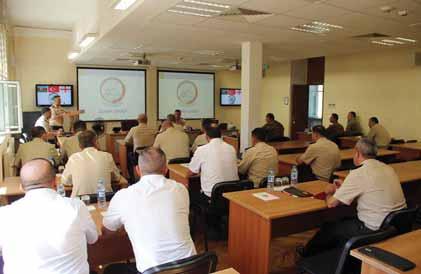
Despite a history of keeping Russia as its own big brother against the predations of Azerbaijan and Turkey, that sibling has been rather lackluster in its performance of the anticipated protective duties. Azerbaijan has crept into Nagorno-Karabakh, taking back territory
Armenia claimed in the First NagornoKarabakh War during the 1990s.
While this has caused Yerevan to look elsewhere for military allies, it is surprising to see Georgia turn its back. Georgia, despite receiving immense economic benefits from its Azerbaijani connections, still receives almost $152 million in imports from its southern neighbor, according to the United Nations COMTRADE database. Tbilisi should not hesitate to use its close connection to Yerevan to play a larger role in regional peace and stability.
Leaving Armenia out of military cooperation projects outright is unlikely on the table for Georgia, but the cozying of relations with the Turkic brothers does not paint a hopeful picture. As Armenia searches for new friends, Georgia has an opportunity to extend its hand, and the proverbial olive branch, in brotherhood and be the ‘cooler head’ between Baku and Yerevan. As cross-border incidents between Armenian and Azerbaijani troops seem to be increasing in recent days, the time is riper than ever to embrace a realistic, actionable, and sustainable peace plan by way of Tbilisi’s role of moderator.
 OP-ED BY NUGZAR B. RUHADZE
OP-ED BY NUGZAR B. RUHADZE
When, eighty years ago, Bertolt Brecht, the famous German playwright of the modernist literary style, thought about turning an old Chinese fable about a young woman into his celebrated play, he thought that Sakartvelo would be the right place for the setting of his dramatic tale. The main line of the story has it that a poor Georgian peasant girl saved the life of a baby boy and became a much better mother to him than his affluent biological parents were. It happened so that the actual mother desired to get the child back for some covetous reason, but his foster-mom would not give him up, so a bitter fallout took place between them on the subject of identifying the true mother. In the finale of the play, the judge who handled the case decided to devise a test for the sides to make the fairest possible judgment on the issue. He drew a chalk circle, placed the boy in the center and said that the real mother would win by pulling the child out of the circle. The foster-mother refused to pull the boy’s hand because she didn’t want to hurt him, even if the judge compelled her to do so. Finally, the judge famously proclaimed the poor peasant girl was a true mother because she had demonstrated
genuine love towards the child. This was the parable part of the intended story. Let us now go to the actual narrative of the day: the dominant political discourse in the Republic, based on the choice of vector of the country’s future development, a tug-of-war overwhelming our politically exhausted and economically long-expectant people. The current agenda has identified the main question that needs to be answered: Is Georgia still strong and firm on its way
to Euro-Atlantic integration, or not? The current government insists that nothing has changed since the collapse of the soviet regime, when the unbending choice was made to join the EU and NATO. The opposition to the current government, however, is trying to prove that the deviation from the long-chosen course is evident, alerting the population to the smell of betrayal, and claiming Georgia’s Western future is very much at stake. Based on what the foreign and local
media are telling the world, the West is visibly frustrated and verbally irritated by the anti-Ukrainian and pro-Russian rhetoric of this Georgian government and the ruling political party, who, every so often, criticize not only the opposition but even the European Union, NATO and other Euro-Atlantic institutions, as well as some well-known personalities operating on behalf of the Western block. Yet, the government and its supporters insist that they are doing their utmost
to maintain peace, to avoid the country being pulled into the crazy war, and to enhance the standard of living in the country, claiming that this kind of governmental policy has no alternative even at the cost of damaging relations with some Western decision-makers.
Georgia is exactly like the little boy, standing in the middle of the Caucasian Chalk Circle, waiting for the quarrelling sides to start tugging on his fragile arms to drag him either to one side or the other. Indeed, the West wants Georgia to be on its side, having a number of reasons for this, including considerable financial and other types of investment to pull the nation out of its post-soviet quagmire. On its own part, Russia is doing its utmost to keep Georgia within the sphere of its own geopolitical influence. The contradiction between them may very well end up hurting Sakartvelo if the sides continue pulling the nation from both sides, relentlessly tearing it into two.
There is another version of the climax of the plot which coincides with Brecht’s happy ending, provided one of the pulling sides lets Georgia go, as the foster-mother did in the story. A third ending, and possibly the best, to the story is also available and that is letting Sakartvelo be conveniently sandwiched between the two, so that it is not threatened by the perennial bickering between Russia and West, happily developing itself without the fear of being ‘caught red-handed’ while cooperating either with one patron or the other.
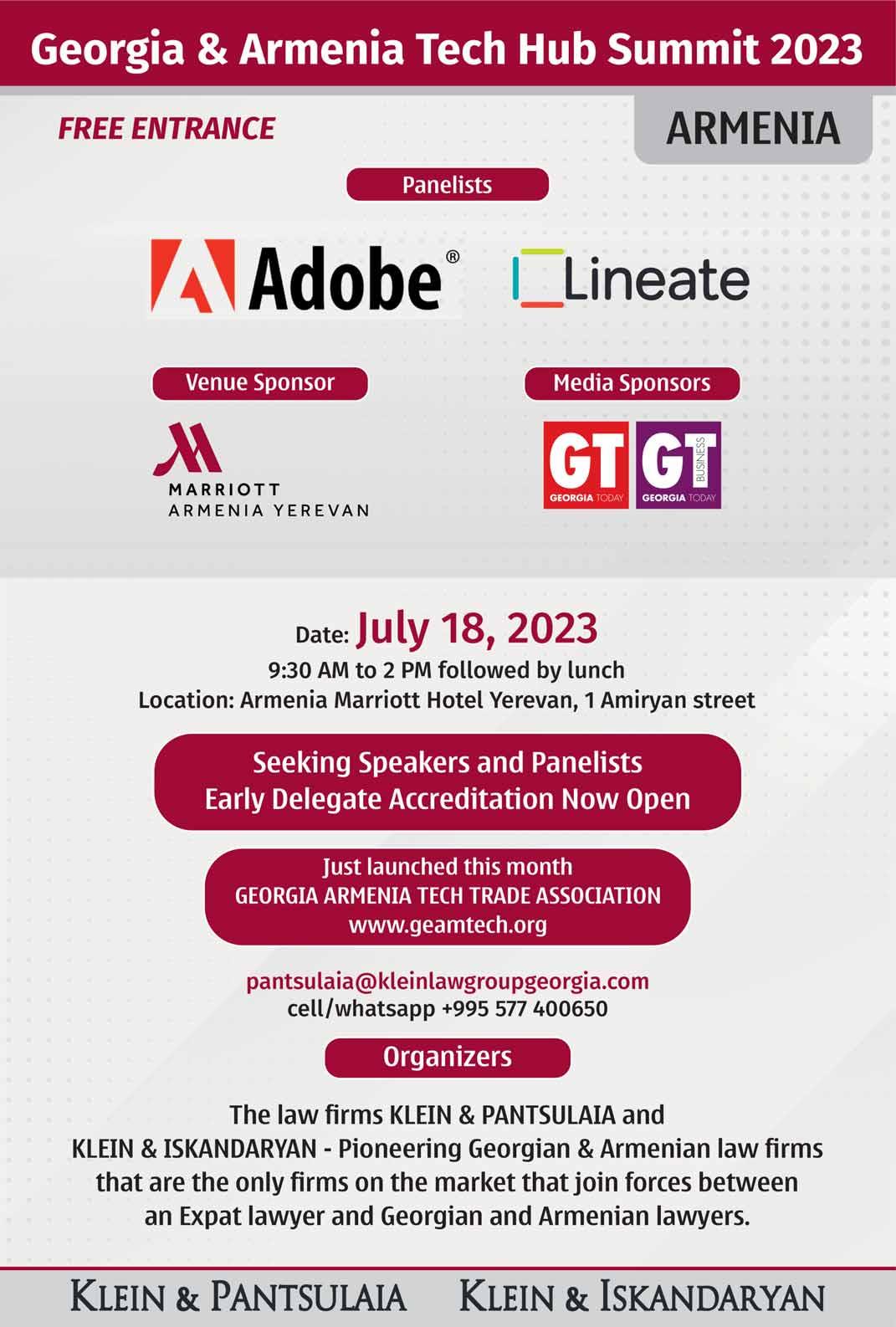

In light of Prof. Orlando Figes latest book, “The History of Russia,” Radio Free Europe’s Georgian Service sat down with him to talk about Russia’s history and how much it informs its decisions today.
IN THE ESSAY VLADIMIR PUTIN
PENNED BACK IN 2021, “ON THE HISTORICAL UNITY OF RUSSIANS AND UKRAINIANS,” HE CLAIMED UKRAINE WAS NOT A NATION. HAS HE, AGAINST HIS WISHES, MADE THEM INTO ONE FOR GOOD?
Absolutely. Until 2014, Ukraine was a complicated and divided society, EastWest, generationally in many ways. But since then, Ukraine has come together as a nation, proven in the way it's fought to defend itself since February 2022. Putin made the very beast that he didn't want to exist and denied could exist.
MANY CLAIM PUTIN SEEKS
HIMSELF A PLACE IN THE HISTORY BOOKS, AND HE OFTEN INVOKES THE NAMES OF PETER THE GREAT AND SO ON. WHAT DO YOU THINK HISTORY HAS IN STORE FOR HIM?
He doesn't seem to have much longer the way things are going, but my guess would be he's going to end up rather more like Nicolas I than Peter the Great.
Peter the Great “took back” the Baltic lands into Russian sovereignty. Nicolas I went to war against Europe to defend what he saw as the greater Russia stretching to the Balkans, and indeed in a metaphysical sense to the holy lands, where he went to war to bully the Turks into giving the Orthodox the rights over the holy shrines. He underestimated the ability of the Turks to defend themselves, just as Putin has underestimated the ability of the Ukrainians to fight back. And he underestimated the unity of the Western powers to support even a Muslim power such as the Ottoman Empire against an aggressive state like the Russian Empire. Nicolas I first lost that war and died in miserable circumstances. He went down in late 19th century history as the worst tsar of all times. And to me, it looks increasingly like Putin might end up with something of the same.
sible, because the pressure of the war is most likely to bring down this Putin regime. My hope is that this summer counteroffensive will break through and create pockets of collapse on the Russian side, and the Russian troops will begin to see through the lies of what they've been told, why they're fighting the Ukrainians. And maybe, just maybe, we will have a repeat of 1917, the exposure of the lie of WW1. It could turn things very quickly.
he will outlast the willingness of the West.
EVENTUAL RUSSIAN DEFEAT. It depends what you mean by victory and defeat. If victory means Putin staying in power and annexing the four territories he's declared Russian, and keeping Crimea, and getting some security deal over NATO expansion, then it'll be more of the same, and he’ll be able to step down with all the laurels of victory and the status in the history books that he has written on his agenda. And then we'll get Putin 2. And this is really unthinkable, and I don't think any peace is even possible with Putin in power.
Russia in defeat, then? My worry is that if Russia is brought to its knees, and the economy allowed to suffer, we’ll have the real possibility of a new revanchist movement and anti-Western nationalism.
Whatever happens, in victory or defeat, it seems to me that Russia is going to be a lot weaker, and a lot poorer, for this war, and very much more isolated from Europe and the West in general. It will effectively become a sort of client state of of China, providing discounted fuel, raw materials, and minerals to the Chinese economy. That's where its future will be, which is a great tragedy. But the Russians have brought it on themselves, I'm afraid.
republican governance.
I write in the book an example in 1917, Tsar Nicholas II had just been overthrown. One of the Mensheviks attends a socialist meeting of the soldiers, and they all say “Long live the Republic! Now, let's elect a tsar!” And they want to elect him as a tsar. He leaves that with sense of “Oh, my God, what hope is there for the Russian people if as soon as they get their freedom, they want to elect a tsar?”
That mythology has to be bust. The Russians have to be presented with an alternative vision of statecraft, which involves them, which is politically accountable, which is elected, rules by law, which respects human rights. If they were given that, I don't think they would object to it, it's just that they haven't had it.
Yes. Even if this summer brings about some success for Ukraine, it's going to take more than one counteroffensive to weaken and destabilize the military political system to the point where they start suing for peace or suffering an internal crisis. And we've got the American elections coming up - if Trump wins the elections? Or if other big geopolitical players like China weigh in on the Russian side? It's going to be a long haul, unless there's a more precipitous collapse this summer on the Russian military side than perhaps we had hoped for. Putin may wonder if the West really cares about Ukraine as much as he and his cronies do. If not, will the next American president support another three, four years of arming the Ukrainians? Ultimately, I think the biggest factor there is China, though. I don't think China's interests are served by letting Russia lose this war. Whether it is prepared to support it, and even cross the Rubicon to support it with direct military aid, I don't know. But it's fairly obvious that it's not in China's interest to let Russia lose.
RUSSIANS ALWAYS SEEM TO SEEK OUT A STRONG RULER, AND THIS HAS BEEN HISTORICALLY SO. WHAT DOES IT TELL US ABOUT THEIR CAPACITY TO CHANGE?
OF
It's important to keep the Ukrainians armed and supported in every way pos-
We may wish for the Putin regime to collapse under military pressure, with dissent, opposition street protests, but if there's a military collapse, we could end up with a civil war or even the complete breakup of Russia, with a type of warlord emerging as a political military leader, a power struggle with arms, with parts of the mercenary army that have been mobilized and paid for by the state and oligarchs, and with a nuclear missile and tactical nuclear weapons armory possibly at the disposal of these people. With that in mind, I don't think we want to defeat Russia for sure, we don't want to push it into a catastrophe of civil war and chaos. There's a balance to be had. I suspect it's a discussion being had in NATO, in Washington and in all the Western capitals at the moment: how far one allows it to escalate, because it's escalating quite fast. Just keeping the Ukrainians supplied with arms to fight and defend themselves, without necessarily going on a strong offensive that would escalate the war from the Russian side, was on the whole the best policy, because in this war Putin thinks time is on his side, meaning that he thinks that
WHAT WOULD RUSSIA LOOK LIKE POST-PUTIN? IT WAS ALSO THE SUBJECT OF THE CONFERENCE IN BRUSSELS “THE DAY AFTER.” LET'S TAKE TWO SCENARIOS: EVENTUAL RUSSIAN VICTORY AND
In many ways, modern geopolitics still revolve around the competition between land and sea powers. A critical geographic area where this plays out is the Eurasian landmass. The Trans-Atlantic order is pitted against the Eurasian system, where Russia, China and others attempt to build a new vision of bilateral relations and ultimately change the present.
The sea powers are nevertheless more resilient. They possess a critical advantage – they can lose a war without bringing down their entire geopolitical power. For example, the US was unable to attain total victory in Afghanistan, nor was it able to do so in Iraq or during the Cold War in Vietnam. All these campaigns ended ignominiously for Washington, though America was always substantially stronger than its opponents. The US withdrew (in a way, lost), but it was
hardly defeated in the long-term. The Cold War was won, and the US still possesses a wide range of tools which safeguard its primacy in the economic and military areas.
The same logic applies to other sea states. Great Britain was able to withdraw from Europe in 1940, and in 1810 when it faced Napoleon. But the country did not lose the war because it could withdraw and reconstitute its powers – physical distance served as its single most important advantage.
In contrast, land powers do not have the luxury of withdrawal. They mostly wage campaigns in the neighboring territories, and defeat there could easily evolve into existential problem for the big country. Russia’s defeat with Japan in 1904-05, with Germany in World War I or in Afghanistan in the 1980s, spelled disaster for the respective Russian governments. There was not enough physical distance to make those defeats less traumatic.
This brings us back to Russia’s war on
Ukraine and the fact that, so far, Moscow has not been able achieve decisive victory. Ukraine has not only successfully resisted, but also mounted effective counter-attacks which led to the return of significant portion of the initially lost Ukrainian territory. Powerful enough can at times turn out not so capable of carrying out successful military campaigns. Due to geography, a stalemate or military defeat in Ukraine could undermine the very foundation of the present Russian state. No wonder that politicians in Moscow see the war in existential terms. The stakes are high, and defeat is fraught with likely upheaval. Once we factor in the role of geography in the ongoing war in Ukraine, it becomes clear why Russia has failed to achieve its major goals – Ukraine’s vast geography prevented a quick military victory. Iraq’s distance from the US, as well as the country’s unstable neighborhood and porous borders with Iran, Turkey, and Syria further complicated America’s chances for victory. Geographic con-
It is a phenomenon of Russian mythology that the people want a Tsar, but it’s not necessarily in the Russian DNA, or in the cultural mix of what it is to be a Russian. Michail Bakunin, the 19th century Russian anarchist, wrote that for the Russians, the Tsar like a god, because he's a projection of their utopian dreams. And there are many examples of Russian people following a tsar because they thought he was a sort of deliverer from injustice, from exploitation and enslavement. And, indeed, one might argue that the basic institution of Russian society until collectivization in the 1930s was the Russian Obshina, the Russian commune, which was basically a patriarchal village self government. But it did have, at its heart, some basic principles of the Russian people, which weren't quite egalitarian, even socialist. And Marx's theory is value derived from labor, not capital. That's at the heart of the Russian peasant culture. So, I would say that this idea that the Russians needed or wanted a tsar is actually what they've been told for hundreds of years, and which they might have believed, because they've had no alternative, because they've had no tradition of parliamentary rule or
An awful lot, but not necessarily in a direct way. The cult of Putin runs parallel to some degree to the cult of Stalin, in that he's projected an image of himself as the strong man, the only man really capable of defending Russia against foreign hostile powers, and he’s not afraid to use Stalinist methods of terror and threat. When he talks about fifth columnists and enemies of the people, he doesn't have to go to the lengths that Stalin went to kill people or send them to the Gulag, because the memory of that is still strong and has been passed down through the generations in Russia; all he needs to do is wave a stick and arrest 20,000 people at the beginning of the war to repress the street protests against it, and that's enough for people to scurry away and be quiet in a way that leads many Western people, certainly a lot of Ukrainian people, to say they're cowards. But the thing is, people remember what Stalin was like. And that is the power that Putin indirectly takes from Stalin. Stalin built a very effective police state, and it was a lot more efficient than Putin’s police state, which is inept, clumsy, brutal, and does things that are intimidatory and barbaric to its own people.
The fundamental thing about the Stalinist revolution, which remains at the heart of the Putin system, is the reversal of the notion of accountability. Political accountability is at the heart of democracy, that politicians are leaders and answer for their mistakes. Stalin managed to reverse that in a sophisticated way so that the people who answered for the mistakes of the bosses were the people underneath them. And it’s important to get that message across to the Russians, because that's what's happening now. And that's what's keeping people in line with Putin at the top of the system.
straints complicate China’s ambition of taking over Taiwan and even if Beijing decides to do so the success of the military operation will be far from guaranteed.
Ultimately, geography is not a recipe for victory. So to understand the true balance of power, one needs to look beyond the country’s geography and assess economic and military capabilities as well as the way of thinking of political elites and what we need to consider when analyzing the present and forecasting the future.
In this battle between the sea and the land powers, the latter are more constrained geographically and do not have the luxury of defeat. The long list of wars shows that sea powers are more stable and secure, even though are they could be defeated in battles and indeed in entire wars. What matters is the long-term perspective, and the sea powers turn out to be far more resilient. They only fear internal unrest caused by poor governance and economy. Land powers also
fear potential threats from neighbors, deploy armies to protect borders and often have their budgets wreaked. One misconception about sea powers is the argument that the Britain in 19th century or the US in the more recent past often failed to gain a foothold in the heart of Eurasia. The reality is that they did not really need to do this. A permanent presence in the heart of Eurasia with limited or no sea access would be self-defeating. What sea powers have aimed at is rather a limited military presence on the outskirts of the continent which would allow them to prevent the creation of military coalitions capable of deploying powerful military fleets at sea. The US and Britain have done this in both world wars and during the Cold War, and Washington continues to do it nowadays when it comes to China and partially Russia.
GeorgianGlassMarket(GGM)
is a Georgian company focused on the production of environmentally friendly glass products. It provides customers with a reliable and comfortable service in its provision of top quality products made using the best materials and modern technological processes. They have no limits in terms of size and shape, and they even make custom glass tar for the company's products. To find out more, GEORGIA TODAY talked to
Tea Gorozia, GGM Marketing Director.
“Georgian Glass Market was founded in Georgia in 2021, and in the short time since has managed to become the largest importer of glass tar and packaging materials in the market. Our founders decided to create the company based on their accumulated experience in the wine business sector, and knowledge of market challenges and ways to solve them,” she tells us. “The company was created to simplify the work of Georgian entrepreneurs and help them in the production of wine, chacha, brandy and soft drinks. We’re a growth-oriented company, and every day we try to increase our range of products, simplify, and make our services as accessible as possible.
YOUR COMPANY PARTICIPATED
IN WINE EXPO GEORGIA 2023. TELL US ABOUT IT.
GGM took part in the Wine Expo for the first time this year, with a large and comprehensive stand, and was well appreciated by the visitors who came to the



The company is focused on quickly and comfortably providing Georgian manufacturers with glass tar and the materials necessary for molding, so that the manufacturer has the opportunity to concentrate as much as possible on the main task - to create and develop the product.
The company offers its partners not only glass containers, but also a full range of materials needed for molding and packaging.
The advantages of GGM are the best price in the market, fast delivery service and flexible payment schedule.
event. Many of our contractor companies and new customers were introduced to GGM products in detail and during these three days we gained the interest of many manufacturers. We presented our full range of glass tar and packaging materials.
 BY MARIAM GORKHELASHVILI
BY MARIAM GORKHELASHVILI
The taxi-hailing service TaxiWomans, exclusively catering to women and adolescents under 16, is set to relaunch with its app on July 1, according to founder Anita Chankselian’s interview with BM.GE.
The CAREC Senior Officials meet in Georgia. Source: CAREC
Representatives from Central Asia Regional Economic Cooperation (CAREC) Program member countries reviewed the progress made in CAREC 2030 Strategy clusters during the 2022-23 period at the annual Senior Officials’ Meeting (SOM) held in Tbilisi, Georgia, on 13-14 June 2023.
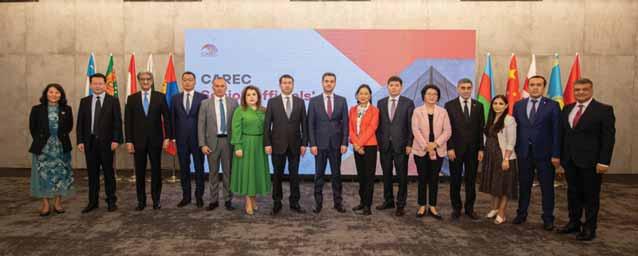
Officials discussed the theme for the 2023 Ministerial Conference and plans for preparing the CAREC Climate Vision, a forward-looking framework outlining the member countries’ strategic objectives and measures to address climate change in the region. The CAREC Climate Vision foresees a region that is resilient to climate risks, committed to reducing greenhouse gas emissions, and is actively engaged in transitioning towards a low-carbon economy.
The meeting also discussed plans for establishment of the CAREC Climate and Sustainability Project Preparatory
Fund: a multi-donor trust fund which aims to support CAREC governments in project preparation and readiness in a climate change responsive and sustainable manner.
High-level representatives from CAREC member countries, including Azerbaijan, Georgia, the People’s Republic of China, Kazakhstan, Kyrgyz Republic, Mongolia, Pakistan, Tajikistan, Turkmenistan, and Uzbekistan, participated in the SOM. The meeting served as a platform to underscore CAREC’s commitment to environmental stewardship and sustainable development.
“The CAREC region has a great opportunity to lead the way in the global transition to a green economy,” said Ms. Xiaohong Yang, Deputy Director General, Central and West Asia Department, at the Asian Development Bank. “Regional cooperation will be essential for the CAREC region to successfully transition to a green economy. The CAREC region
can share knowledge and experience, pool resources, and coordinate policies to accelerate the transition to a green economy.”
She also thanked Mr. Genadi Arveladze, Georgia’s deputy minister of economy and sustainable development and CAREC National Focal Point, for hosting CAREC activities in 2023. “Georgia has played an invaluable role in facilitating CAREC and in shaping the deliverables for this year, and we sincerely appreciate your deep commitment to regional cooperation,” she said.
The CAREC Program is a collaborative initiative of countries and development partners in Central Asia, South Caucasus, and South and East Asia to promote economic growth and poverty reduction in Central Asia. CAREC 2030 serves as a long-term strategic framework to connect people, policies, and projects for shared and sustainable development in the region.
“Two years ago, TaxiWoman was established and, despite a positive response and readiness, it, unfortunately operated for only one month, solely relying on telephone calls. After the company ceased operations, I decided to rebuild and continue working, leading us to develop an app.”
During the process, the idea of including men and transforming it into a standard taxi service emerged, but ultimately, Chankselian opted to prioritize women once again, leading to the name TaxiWomans. The company will specifically cater to women and teenagers under 16. And, from July 1, the app and telephone service will be available again in the Georgian market. Chankselian mentioned that there will be specific restrictions for drivers within the company.
“Fortunately, we didn’t encounter any difficulties in finding drivers. The women who previously worked for our company will be actively involved once again. We have around 30 female drivers, and this brings me great joy. We have already received numerous applications, and we will begin conducting interviews as the interest from women has surpassed our expectations.”
The founder of TaxiWomans mentioned that the app was developed using personal finances, along with contributions from two programmers, which incurred significant expenses. Nonetheless, despite these costs, the company offers a low percentage commission to drivers.
“Considerable expenses were incurred in developing the app. However, the company has prioritized creating favorable working conditions for employees and does not require a high percentage of their income. As a result, drivers will earn higher profits compared to the company.”
Regarding the tariffs, Chankselian explained that due to the limited segment served by TaxiWomans, the service’s prices would be slightly higher than standard rates. However, the company will adjust the prices to remain competitive and affordable within the market. To recap, TaxiWomans initially launched in September 2021 but ceased operations in October of the same year. Now, with the upcoming app and telephone service, it is poised to make a strong comeback.
larger conferences in the coming years.
We are a completely independent association, so our doors are always open to any medical institution.”
Megalab is the largest multidisciplinary laboratory in the Caucasus region, combining both clinical and pathological departments. The laboratory is designed in accordance with the JCI (Joint Commission International) standard, which is the highest body for accreditation of medical institutions in the United States
 BY MARIAM MTIVLISHVILI
BY MARIAM MTIVLISHVILI
On June 3, 2023, Tbilisi hosted the GIMPHA Eighth International Health Conference. The conference was held by the Georgian International Medical and Public Health Association (GIMPHA) in partnership with Megalab, the first JCI accredited laboratory in Transcaucasia. The conference aimed to facilitate meetings between Georgian and European healthcare professionals, allow the sharing of knowledge and experience, and promote the development of medicine.
To find out more about the importance of the conference, GEORGIA TODAY talked to Lika Ghachava, head of the Georgian representative office of the Association GIMPHA and Alex Baidoshvili, professor, president of the GIMPHA association, head of the pathology department of Megalab.
“GIMPHA was founded in 2012 in the Amsterdam. Georgian doctors working abroad are united in this association,” Lika tells us. “At the 8th International Health Conference, there were many people who wanted to attend but as places
were limited, they couldn’t. In addition to bringing our professionals from abroad who shared their experience with Georgian doctors, contacts were exchanged and new projects were planned.”
“Our association is actively involved
is worth noting that every year there is a great response to these conferences, but this year especially many doctors wanted to participate, which makes us happy. About 500 doctors registered for the one-day conference, which is a very

accreditation and become the first medical laboratory in Transcaucasia to receive this accreditation. This made us the 39th laboratory in the world, and the first in Georgia, to have passed this accreditation.
We guarantee a high-precision laboratory component, which is, together with the diagnostic component, focused on patient data safety and privacy, and high accuracy of laboratory studies.


In addition, we have ongoing studies
in the development of medicine in Georgia, this is the goal we united around,” Alex says. “The main goal of this conference is the exchange of information. It
large number. We are saddened to say that we had to turn away too many of our colleagues because the number of places was limited. We will try to hold
of America. To find out more, GEORGIA TODAY talked to Nino Ghulatava, medical director of Megalab.
“Foreign partners took part in the creation of Megalab, which will continue to actively participate in the process of quality development and maintenance in the future,” she tells us. “Megalab is a laboratory hypermarket that constantly takes care to raise the qualifications of its staff with various international and local trainings. In addition, Megalab promotes the upbringing of the next generations, the education of students and residents and their employment, within the framework of the development of corporate social responsibility.”
She notes that since January 2019, more than 100 medical institutions, including leading hospitals, have been cooperating with the laboratory. Today, Megalab serves more than 3,000 patients a day, and the number of tests performed daily exceeds 10,000.
We ask her to tell us about the Megalab services.

“Megalab is the only multidisciplinary laboratory in Georgia,” she notes. “Therefore, it is possible to conduct all types of laboratory research here. The service is available to everyone, as Megalab has both a central laboratory and branches in Tbilisi, Kutaisi, Rustavi and Batumi.
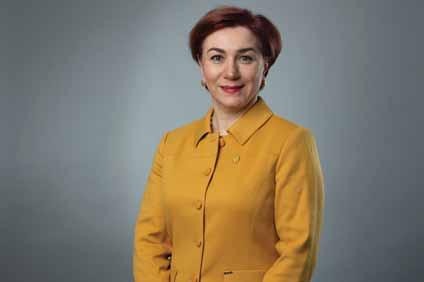
In addition, Megalab offers the service ‘Mega Drive,’ through which it is possible to submit both blood samples and smears without getting out of the car. Also we have another service - people can call us and we will come to them for free. There is also a department of infectious diseases in Megalab, which is headed by Giorgi Kandelaki.
We have received JCI international
looking into genetic mutations, which is important in clinical oncology. We strengthened our oncohematological
direction in microbiology, and started the identification of difficult to diagnose fungi in Georgia. We have added a lot of research in the clinical direction, multiplex analyses, etc.
TELL US ABOUT MEGALAB’S FUTURE PLANS.
“In the near future, we will be offering patients tests performed on a sequencer, which will allow us to conduct genetic studies, pre-natal diagnostics, high-resolution histocompatibility of stem cell transplants, and of course, bacterial sequencing. These are the issues we will finish working on soon,” Nino noted.
GEORGIA TODAY met Rupert Schmidt, President of Biologique Recherche, a French professional cosmetics brand with a long history. He was happy to talk to us about the brand's 50-year history, its core concept and values, the brand's exclusive products and Biologique Recherche's unique procedures, which have made Biologique Recherche a skin care expert in 85 countries around the world. “Biologique Recherche is a cosmetic brand with a long history, created about 50 years ago,” he tells us. “Its establishment was connected with the high demand for special, professional cosmetics in the market. Biologique Recherche was founded by a physiotherapist and biochemist couple, Ivan and Josette Alouche. In a research laboratory in Paris, they created products that were not only made using special, high-quality ingredients, but also the protocol for using these professional products was specific and exclusive.”
Since its inception, the brand has created individual products that each serve a predetermined specific purpose, and this is the core concept of Biologique Recherche's various professional lines. This is how personalization was established in the cosmetology industry - an individual approach to the characteristics of each person's skin, which is the concept of the brand. The years pass, but
the history and core values of the brand remain unchanged. Only the level of knowledge and science changes, which has improved and progressed so that we are able to offer ever more perfect products to our customers. Imagine, decades ago, we invented lotion P50, which was the first light exfoliating lotion in the entire cosmetics market. Today, everyone knows that an exfoliator is an indispensable product for the functioning of healthy skin and the activation of the cell life cycle of the epidermis. Thus, Biologique Recherche created a new era in the cosmetics industry. Today, the brand has some 100 products intended for facial skin care, which are used for different purposes, following the principle of personalization.
WHAT ARE THE MAIN PRINCIPLES OF BIOLOGIQUE RECHERCHE?
I would call it brand values rather than principles. Personalization, an individual approach to each person, is one of the main values of the brand, which cannot be fulfilled without the highest quality diagnostics. For diagnosis, the best knowledge and perception of the field is needed. We believe that the first key to success and professionalism in our field is a scientific base, the second is in-depth knowledge and education, and the third is enthusiasm and love for our work. The employees of Biologique Recherche are professional, qualified, passionate people.

We have developed and refined unique skin care techniques that are used in
aesthetic centers, offices and spas, and it is also important that users of the brand's products can also perform these procedures at home. With our approach, we help people to take perfect care of their skin not only in cosmetology offices and spas, but also to continue this process at home. That's why, after a complete diagnosis, according to the skin type, we set up a skin care routine for each customer individually, and they then know how and with what technique to use this or that product even at home. We do not follow marketing trends, but precisely define and create high-quality, necessary products, which, taking into account the principle of personalization, give us the maximum effect in the direction of professional skin care. Biologique
Recherche's complete network monitors compliance with all of the brand's unique procedural protocols, guidelines, and accuracy of action, which is what sets us apart from other brands in the cosmetology industry.
TELL US ABOUT THE BRAND'S ONLINE ACADEMY, WHICH IS IN HIGH DEMAND.
As I mentioned before, knowledge is one of the main drivers of our brand. Sharing knowledge is very important. We founded the online academy five years ago, and today it is already a popular, sophisticated and flexible system. The full online course consists of 8 hours, and the sessions are 15-20 minutes long. We have many theoretical and practical courses. This is basic
knowledge that we share with everyone who does business in the vicinity of our brand and concept. Before we start training Biologique Recherche employees, we ask them to complete 15 online academy courses, so their knowledge is solid and qualified. In our online academy, teaching takes place in 24 languages, thus it is available to representatives of virtually any country, in a language convenient for them. During our theoretical courses, the focus is more on scientific knowledge, which in itself is a necessary basis for practical activities.
It is a true academy in its character and structure. It consists of several stages with different goals, and therefore, courses are chosen depending on which direction of the field the student serves. They may be a spa center receptionist or a therapist, and will choose a course based on the specifics of their activity. We have divided courses for therapists according to levels.
“15 years ago, we were in 30 countries; now we are represented in 85 countries, and Georgia is one of them. It is very impressive what Tamar (Tamar Katsitadze - Georgian director of Biologique Recherche) and her team were able to do in Georgia with respect to correct positioning,” Schmidt says. Biologique Recherche is represented in large hotels, spa centers, medical and aesthetic centers of Georgia.
The exclusive distribution of Biologique Recherche Georgia is represented at N8/10 Shroshi Street, where you can purchase products and undergo procedures tailored to your skin.
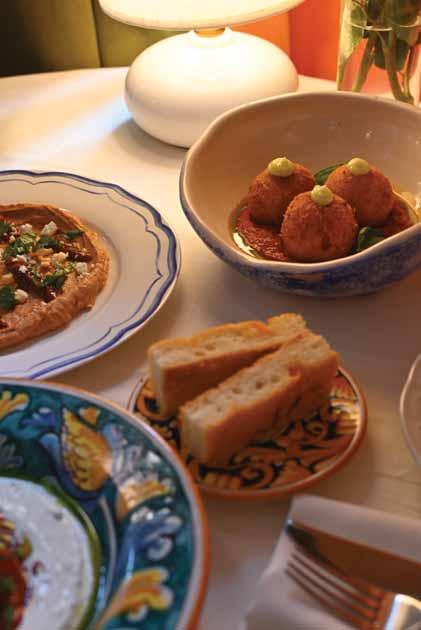
Continued from page 1
The founder of the restaurant, Anna Chkhikvadze, notes that the idea of opening an Italian restaurant in Tbilisi was related to her and her family’s close business relations with the country and getting acquainted with its unique culture and traditions. Surprisingly, prior to that, neither Anna nor her parents had any frequent relation with the cuisine, as all of them are doctors by profession. It’s a family business which,
despite certain difficulties, including the pandemic period, turned out to be successful and continues to make customers happy with perfectly cooked delicacies.
Serving amazingly tasty appetizers, pasta and desserts is the feature of Ambrosiana. However, it also offers less known authentic Italian dishes in Georgia, which are totally worth tasting. These are: classic Amatriciana, a traditional Italian pasta, as well as Carbonara made following a classic recipe, Gricia pasta
which is also less known in Tbilisi, and more.
The main goal of the restaurant is to maintain classic Italian recipes as much as possible and use authentic local ingredients and herbs, which are imported from Italy, as they aren’t available in the Georgian market.
The restaurant recently collaborated with Luka Todua, who gained honorary title of Gault et Millau Guide Young chef of the year. Luka is the finalist of MasterChef Georgia professional season and has years of experience of working abroad. Currently, he is preparing his own signature menu for Ambrosiana, which means that the restaurant will soon offer its guests even more diverse dishes and delicacies at special dinners held on the spot.
The signature dish of the restaurant is salad ‘Ambrosiano’, which has been the favorite dish of the guests since its opening. Notably, the facility also offers a special Bolognese sauce. Another popular dish is Pate, for which loyal customers keep coming back.
The wine list is extensive. Visitors will find a fine Italian wine that suits their taste. The restaurant also has a bar, where special cocktails are prepared. Customers will soon be able to come here to try delicious quality coffee from Milan, which is hard to find anywhere in Tbilisi. Customers can also buy coffee on the spot.
The courteous staff works hard, stays positive and makes the place great. Good service is something clients appreciate here. A lovely decor and interior as a whole, with exciting details, make every guest feel at home, and wanting to come back as soon as possible. Notably, the facility management cares for the employment of the youth, as the majority of the staff, including the chefs, are young people who are growing and developing professionally along with Ambrosiana. Importantly, women hold managerial, leading positions in the staff, which shows the facility’s commitment to employ and strengthen women economically.
Food safety and hygiene is strictly adhered to at the restaurant. The facility operates under HACCP standards, which means that public health and the wellbeing of its customers are of utmost importance.
All the above-mentioned makes Ambrosiana a perfect place to relax, spend time with friends, have a romantic dinner or business lunch. In all cases, enjoying delicious food and drinks in a friendly, family-like environment is guaranteed!
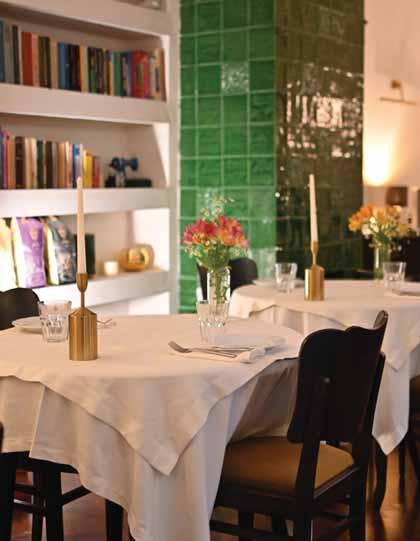
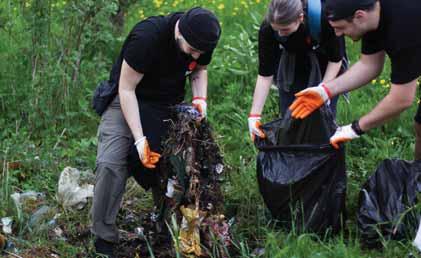 BY SADAGI DONORS PAUL AND CHAUNCIE RADZIANKO
BY SADAGI DONORS PAUL AND CHAUNCIE RADZIANKO
The first Bakuriani Clean-Up Festival organized by Sadagi*, the Georgia Cleaners’ Guild, took place the weekend of June 3-5. The volunteers came mainly from Tbilisi, Gori, Borjomi, and Bakuriani, and included local school students. Participants from about 10 foreign countries also participated, alongside Georgians, all of whom shared a desire become partners in contributing to the health and beauty of our ecosystem.
It was a great success, as were the results: over 400 volunteers, supported by 13 sponsors, seven organizations and the Bakuriani Development Agency collected over 52,000 liters of garbage, and that’s not counting such bulky items as metal, construction materials, and tires!
In total, probably about the equivalent of 1,000 70-liter garbage bags were collected for correct disposal!
On Saturday evening, volunteers were rewarded with a barbecue at the Didveli Gallery, accompanied by refreshments from Bakuriani Water, Teliani Valley Wine, and Tbilvino.
After dinner, participants were transported to Bakuriani Inn for the evening’s
entertainment. One of Georgia’s most famous writers, David Turashvili, inspired his audience with the importance of unity on even seemingly insignificant (but hugely important!) issues as keeping our country clean. Givi Kupatadze’s themes of resilience and positivity reinforced this message by describing Sir Ernest Shackleton’s spectacular Antarctic explorations over 100 years ago. The evening concluded with Ninutsa Gabisonia and Bachi Valishvili performing popular Georgian songs followed by The Jetbird’s more intense music.
And the clean-up effort continued on Sunday, notwithstanding the late night!
Bakuriani resident from Australia, Brett Lubben, inspired the event and coordinated the local effort. Sadagi and local volunteers managed the registration, municipal support, business participa-
tion, local transport, hotel and restaurant arrangements, and more, doing an excellent job considering that twice the expected number of 200 eager cleaners ultimately appeared!
The largest corporate sponsor was investment group Wondernet Express. Additional Golds: Archevani, Crystal Hotel & Spa, Kokhta-Mitarbi Resort, Palitra Holding, Parvus Consulting, and Tegeta Motors.
Supporting organizations included the Bakuriani Development Agency, Procredit Bank - 44 volunteers, the Financial Bureau - 77 volunteers (also a sponsor), the American Chamber of Commerce, Savvy, Keep Georgia Tidy, and the Bakuriani and Andeziti Schools.
Since its co-founding by Nikoloz Shurgaia in 2021, the Sadagi charity Sadagi - About Us has pioneered ambitious
efforts to inspire his fellow-citizens to make our homeland a cleaner, healthier and more beautiful place to live. Over 50 members of Sadagi include Dato Turashvili, Katie Melua, Ilia Zedginidze and companies Dressup, Euroins, PepsiCo Georgia and KPMG.

32 clean-up actions have already taken place at ski slopes, sports stadiums, near historical monuments and other venues. A further sustained effort is necessary to make a real difference, which Sadagi and its growing community are committed to. Monthly follow-ups are already being planned nationwide, including in Gudauri and the Tbilisi Sea.
Such clean-ups and festivals, communicated via TV, press and social media, condition our compatriots against littering, forming lasting good habits, and instilling a mindset of environmental stewardship. We want to involve all of our citizens in cleaning up Georgia’s natural and urban areas on a large scale. Each of us can become an active partner in making our homeland a happier, healthier and more beautiful place to live in and enjoy. Join us @ Sadagi - Home.
his own street and others nearby; he paints from life, so all he has to do is take a short walk and the crumbling magnificence is there for the portraying. Other house paintings come from his village in the Lechkhumi region of Georgia, evidencing his Svan last name, always a bonus for me. His work is rich with color, and with the interplay of light and shadow: bold.
I’m not sure what the nearly ubiquitous small multicolored dots like light snowflakes mean in Guram’s current paintings, but they do (for me) add an air of magic which I find appealing, just a slight remove from reality. It will be no surprise to find him taking a strong place in Georgia’s art scene of today, moving into great success and acclaim. I would buy virtually all of his studio’s work if I had the money, and the space to display it.
On my first visit, I took a friend, and she bought a painting. I also asked Guram if he would let me see any sketches, so he showed me a recent notebook. Then
I dared to ask him if I could buy anything from it, because I love drawings at least as much as paintings. He said that he couldn’t take any sheets out of the book, but offered to sell it to me complete “for 1000 GEL”. Then he laughed, and just gave it to me, leaving me speechless until I could find voice to thank him for such huge generosity. It now hangs, framed complete, in my living room.
When it came time on a second visit to choose a painting to buy, Guram’s advice was, “Pick one which calls out to you.” I was vacillating between two large canvases of nearby old houses with crumbling facades. The first, lit at night, he called one of his favorites. The other was in daylight, and I settled on that. It was only after this that I realized that my pareidolia (finding faces and other features in random places) had given me a face made of the scene’s windows and other features, which delights me. Just as well, because now I can never unsee it…
One of my interests in this last winter in Tbilisi has been finding and collecting the work of new Georgian artists in any medium. While my wife and I have not nearly enough wall space in our apartment to display what I have bought and the work of my own which I wish to put up, I do have gallery rails everywhere, which make changing exhibitions really easy (although I still need to store what is not hanging somewhere). Guram’s piece will have pride of place, however, in a small but growing and very satisfying set.
Tony Hanmer has lived in Georgia since 1999, in Svaneti since 2007, and been a weekly writer and photographer for GT since early 2011. He runs the “Svaneti Renaissance” Facebook group, now with nearly 2000 members, at www.facebook.com/ groups/SvanetiRenaissance/ He and his wife also run their own guest house in Etseri: www.facebook.com/hanmer.house.svaneti
BLOG BY TONY HANMERIbecame acquainted with the paintings of Guram Khetsuriani last year via his Facebook page, to which he posts photos of each new work as soon as it is finished. Then it was a simple matter to call him and arrange a visit to his studio, which is in Tbilisi’s Old Town, not far from Liberty Square.

Guram has been painting much of his life, mostly in acrylic on stretched can-
vases. This paint has two main advantages: it is much faster-drying than oil paint, and it cleans up with water. He has had both solo and group exhibitions in Georgia and abroad, notably in Berlin and New York, and is moving up in the art world. He sells inside Georgia and also ships his canvases across the world to buyers.
Upon entering his studio, I was struck by the many finished paintings covering the walls of every room and standing on the floor. And they were all beautiful. His thematic period at the moment is old houses, of which many examples line

Asolo exhibition of four largescale paintings and one interactive installation of giant arms “Hug” by Georgian female contemporary artist Nestan Mikeladze opened at Crosty Art Space, Tbilisi on June 9. The exhibition will be on display until July 31.

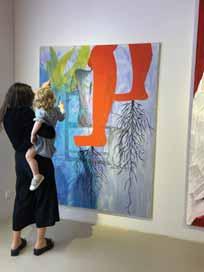


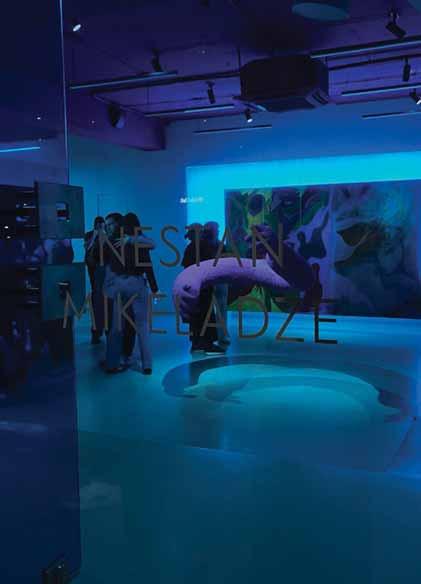
Essay by Levan Mindiashvili
Referencing an act of holding of an infant by a parent, Donald Woods Winnicott, a pediatrician and psychoanalyst whose work has shaped developmental psychology, developed a highly influential concept of a "holding environment" - a protecting and nurturing environment, wherein one's basic needs "to breathe, to eat and drink, to have one's weight supported" – are satiated, and that allows the child to experience the body as the place wherein one securely lives. Extrapolating the concept of holding from parent to family and the outside world, Winnicott saw as crucial to healthy development "the continuation of reliable holding in terms of the ever-widening circle of family and school and social life."
It might sound redundant -if not apparent- to extend the responsibility of paren-
tal care to the systems of power - governments, for example. Yet I can hardly imagine a more ironic entry for the essay about the artist born and based in Georgia, the country - whose vast majority of inhabitants' basic needs have been historically -and still are to these daysneglected and denied.
An act of holding is the center of a solo exhibition of Nestan Mikeladze at Crosty Art Space, Tbilisi. Giant arms connected in a semi-circle hang approximately at an average adult's shoulders height, inviting the viewers inside to be hugged and held. Titled "Hug" (2023), it's made out of plaster and painted bright pink, bringing to mind children's whimsical, joyous plasticine creations and marking Mikeladze's first ventures in three-dimensional objects and installation. The sculpture is flanked by four large-scale paintings (all oil on canvas) -semi-abstracted human figures against drippy, translucent patches of color, suggesting states rather than scenarios. The earliest painting in the show, "I will hold you" (2017) - depicts two figures in the act of embrace with emphasized red/ pinkish arms, a detail that became the starting point of the sculpture.

Nestan Mikeladze is a self-taught art-
ist whose creative explorations started ten years ago from the urgent need to liberate herself from the patriarchal dictatorship generally disguised as "traditions" or "cultural identity." "The standard view of a "feminist" [in Georgia] is that of a woman who wants to dominate men and who aggressively rejects the feminine parts of herself. But for me, feminism is about equality, autonomy, and respect among all genders," - notes the artist, who also -like her contemporary peers- chose to find her voice in the solitude of her studio through careful listening of intuition -of her truth- rather than in a professionalized school. Abandoning a successful career of fourteen years in finance, with an arduous and honest commitment to liberation and truthseeking, Mikeladze seems to embody her home country's yet not fully conscious longing for decolonization.
Winnicott believed in the work of the psychotherapist -i.e., an emphatic, benevolent witness and interpreter- as offering a substitute holding environment. He wrote: ”a correct and well-timed interpretation […] gives a sense of being held physically that is more real...than if a real holding or nursing had taken place.
Understanding goes deeper.” As systems of power increasingly fail in their responsibilities of care, the only way for healing, healthy growth, and a possible future
increasingly relies upon communal acts of benevolence and care.
PUBLISHER & GM George Sharashidze
COMMERCIAL DEPARTMENT
Commercial Director: Iva Merabishvili
Marketing Manager: Natalia Chikvaidze
EDITORIAL DEPARTMENT:
Editor-In-Chief: Katie Ruth Davies
Journalists: Ana Dumbadze, Vazha Tavberidze, Tony Hanmer, Emil Avdaliani, Nugzar B. Ruhadze, Michael Godwin, Ketevan Skhirtladze, Mariam Mtivlishvili, Erekle Poladishvili
Photographer: Aleksei Serov
Website Editor: Katie Ruth Davies
Layout: Misha Mchedlishvili
Webmaster: Sergey Gevenov
Circulation Managers: David Kerdikashvili, David Djandjgava
ADDRESS 1 Melikishvili Str.
Tbilisi, 0179, Georgia
Tel.: +995 32 229 59 19
E: info@georgiatoday.ge
F: GeorgiaToday
ADVERTISING & SUBSCRIPTION
+995 555 00 14 46
E-mail: marketing@georgiatoday.ge
Reproducing material, photos and advertisements without prior editorial permission is strictly forbidden. The author is responsible for all material. Rights of authors are preserved. The newspaper is registered in Mtatsminda district court.
Reg. # 06/4-309
